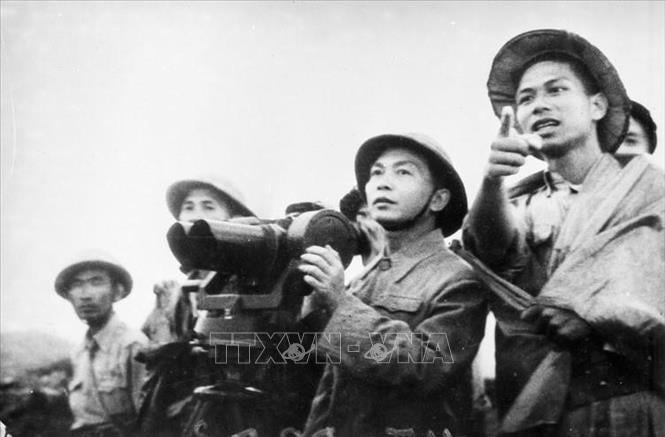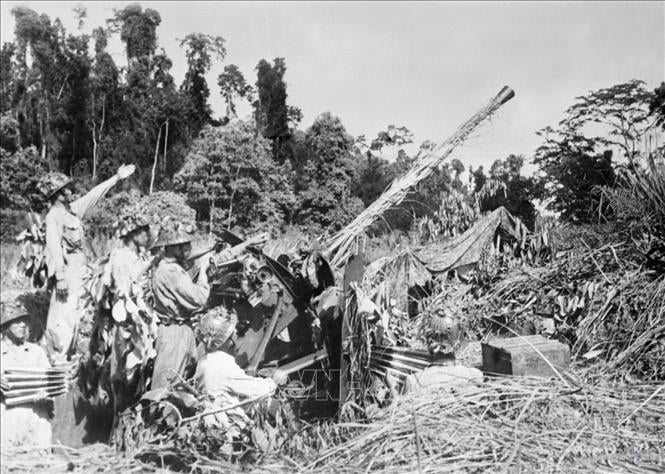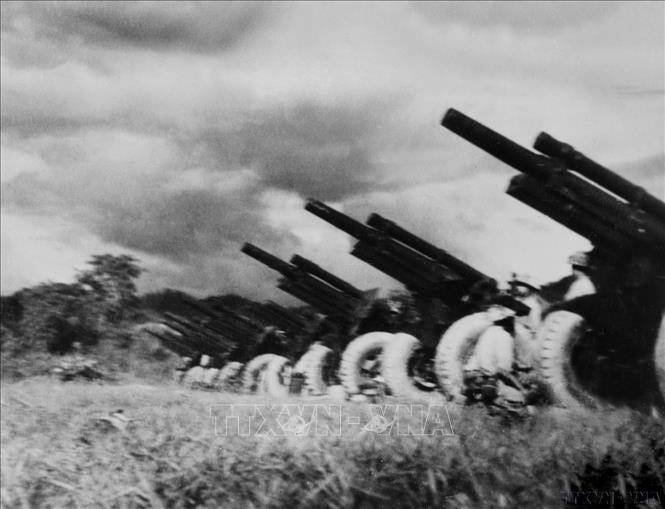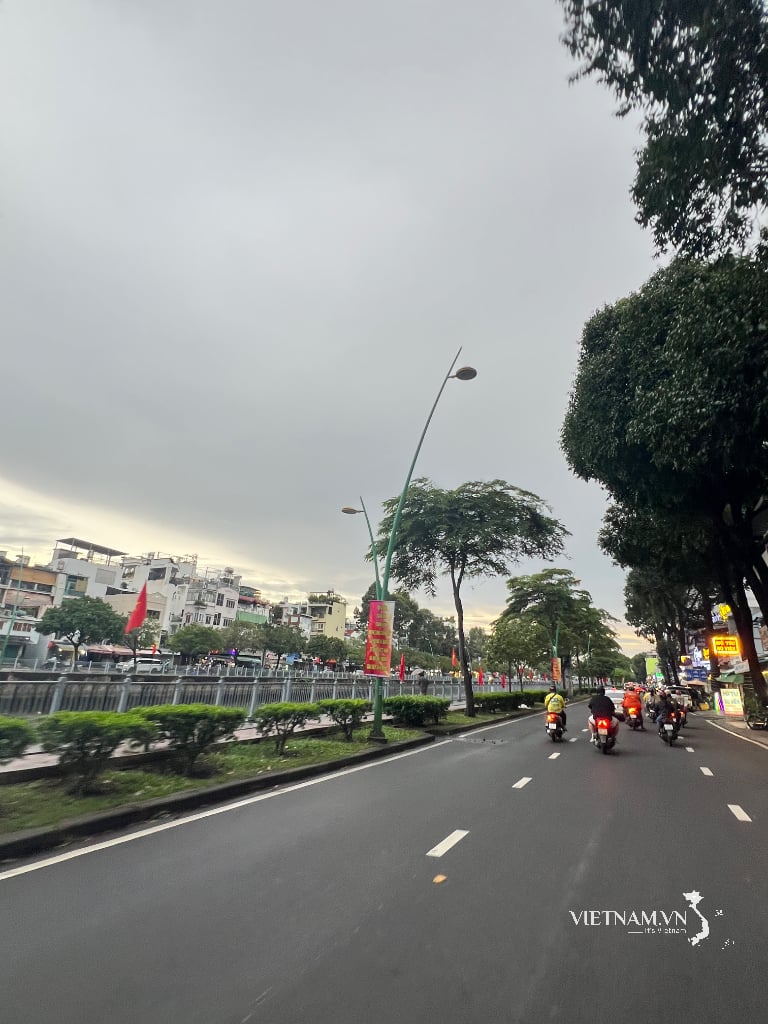
General Vo Nguyen Giap observes the battlefield for the last time before giving the order to open fire, marking the beginning of the Dien Bien Phu campaign. Photo: VNA archives.
General Vo Nguyen Giap – an outstanding Commander-in-Chief, deeply imbued with the directives of the Politburo and President Ho Chi Minh, and with sharp intellect and the courage of a military leader, made the crucial decision to shift from the motto "Attack quickly, win quickly" to "Attack surely, advance surely." The historic Dien Bien Phu campaign ultimately triumphed precisely because of this important turning point. General Vo Nguyen Giap's military genius has been recognized and admired throughout the world.
Received a particularly important assignment.
During the protracted resistance war against French colonialism, General Vo Nguyen Giap directly commanded many major campaigns, the largest of which was Dien Bien Phu. The victory of this campaign had a significance and scale far exceeding previous campaigns in many aspects, further affirming the outstanding strategic genius of the Commander-in-Chief.
In late December 1953, the Politburo decided to destroy enemy strongholds in the Northwest. On January 1, 1954, the Politburo appointed the leadership and command body for the campaign. General Vo Nguyen Giap was appointed commander-in-chief and concurrently Party Secretary of the Dien Bien Phu Front. The plan to deploy reinforcements to the Northwest was implemented.
General Vo Nguyen Giap assessed: “This will be the first time our army launches a large-scale attack on a fortified complex with ten thousand troops. Our officers and soldiers have been prepared to attack the fortified complex... The upcoming battle will be an unprecedented challenge for us in the war. We have chosen the mountainous forest battlefield as a place with many favorable conditions to destroy the enemy. But Dien Bien Phu is not entirely mountainous forest. There is the largest plain in the Northwest. Many strongholds are located on the plain. Our army will have to conduct many battles with mobile troops supported by aircraft, tanks, and artillery on flat terrain like in the plains...” (1)
On January 5, 1954, General Vo Nguyen Giap and the forward command post of the General Staff set off for the front. Before going to the front, General Vo Nguyen Giap went to greet Uncle Ho at Khuoi Tat. Uncle Ho asked: “You are going so far away, are there any obstacles in directing the battlefields?” (2) The General replied: “…The only obstacle is that it is far away, when there is an important and urgent problem, it is difficult to ask for the opinion of Uncle Ho and the Politburo” (3). Uncle Ho encouraged: “The General Commander is going to the front, ‘the general is outside’! I give you full authority to decide. This battle is very important, you must fight to win! Only fight if you are sure of victory, do not fight if you are not sure of victory” (4). The campaign commander “felt that this responsibility was very heavy” (5).
Changing the battle plan - The most difficult decision in a commander's life.

Our anti-aircraft artillery forces fought bravely and achieved outstanding feats, not only protecting the skies and supporting infantry battles, but also contributing to blocking air support for the French forces at Dien Bien Phu. Photo: VNA archives.
During the Dien Bien Phu campaign, and perhaps throughout General Vo Nguyen Giap's entire military career, the decision to change the combat strategy from "quick attack, quick victory" to "steady attack, steady advance" was considered the most difficult decision – as he himself admitted. This decision demonstrated the sharp military thinking and leadership of a commander; but at the same time, it also reflected his deep understanding of Ho Chi Minh's military thought on "fighting surely to win"; it showed the humanistic nature of a general who prioritized the common good, always emphasizing the role of the collective and respecting collective opinions for the common good.
On January 12, 1954, General Vo Nguyen Giap and some officers arrived at the front command post. At this time, our side and the advisors agreed to use the quick attack method to destroy the enemy, because "a quick attack will win quickly, the troops are still strong, there will be fewer losses and we will not have to deal with the great difficulties of ammunition and food for tens of thousands of soldiers and civilian workers in a long-term battle" (6). The planned time to start the attack was January 20, 1954.
After hearing the situation report, the commander “felt that this plan was not good and wanted to hear more about the situation,” because “the troops still need time to build roads. The enemy still has the opportunity to increase troops. Even now, a quick victory is difficult. It will surely be even more difficult later” (7). However, he still kindly instructed the officers on how to overcome difficulties and complete the task according to the plan that had been disseminated. He also determined that he needed to continue thinking to better understand the actual situation and find more factors that could lead to victory by a quick victory.
The General's concern was not only because of President Ho Chi Minh's instructions, "This campaign is very important, we must win, if we are not sure of victory, we should not fight," but also because of his responsibility to the soldiers' lives and blood. "We are not allowed to lose this battle. The majority of the elite of the main army during the eight years of resistance are concentrated here. These are extremely valuable resources, but also very few. From 1950, when the major campaign began, until this spring, it has been the same units, the same people. I know each regiment, each battalion, each main company, and I know the company and platoon officers and soldiers who have made outstanding contributions. I have clearly seen that everyone who goes to war this time is ready to sacrifice themselves to win. But the task of the campaign is not only to win, but also to preserve these valuable resources for the long war..." (8). If the campaign fails and the main divisions suffer heavy casualties, what will be the future of the resistance, and what will be the position of our diplomatic delegation in Geneva?
After that, the commander spent many sleepless nights contemplating and weighing the options, but "still found very few elements of victory": "I instructed the envoys to gather information and report anything noteworthy promptly. Everyone reported a very high level of combat readiness among the officers and soldiers. The commander of the 312th Division, Le Trong Tan, told me that during the battle, we would have to make three consecutive breakthroughs to reach the center. But this was just a calculation of the work that needed to be done. The commander of the 308th Division, Vuong Thua Vu, in charge of the deep penetration, remained completely silent. On the ninth day, two days before the attack, Comrade Pham Kiet, Deputy Director of the Protection Department, who was monitoring the artillery deployment in the West, requested to speak with me by phone. Comrade Kiet commented: "Our artillery is all placed on field positions, in very open terrain. If we are subjected to counter-artillery fire or air attacks, losses will be unavoidable." Some artillery pieces have not yet been brought to the battlefield” (9).
After postponing the start of the campaign to January 25, 1954, and then another day to January 26 due to difficulties in moving artillery and concerns about the health of the troops, on the morning of January 26, General Vo Nguyen Giap, Commander-in-Chief, made his historic decision: to temporarily halt the attack, withdraw the artillery, and bring the troops back to their assembly points to prepare again according to the motto "Attack surely, advance surely." After several hours of discussion, with a spirit of unity and a high sense of responsibility, the Party Committee finally agreed with this change and unanimously agreed that changing the combat strategy was a very significant decision, a concrete manifestation of the Central Committee's guiding principle of "attack surely, win surely."
It can be seen that what happened at the Dien Bien Phu Campaign Command in the past shows that two factors contributed to General Vo Nguyen Giap's success in reaching a consensus with the collective on the campaign's strategy: firstly, his political responsibility to the Party and the people, and to the sacrifices of the soldiers; and secondly, his practical approach, using reality to persuade the collective to accept the highest requirement, which was to ensure "victory in battle".
The shift in the battle strategy from "Quick attack, quick victory" to "Steady attack, steady advance" is considered the most dramatic event in the history of the resistance war against French colonialism, something that General Vo Nguyen Giap called "the most difficult decision in his life as a commander." And the historic Dien Bien Phu campaign ultimately achieved victory precisely because of this crucial turning point.
"Play it safe" and win.
Implementing the "attack surely, advance surely" plan, with a civilian labor force of over 260,000 people, using all kinds of transport and with determination stronger than mountains, we overcame seemingly insurmountable difficulties, ensuring sufficient supply of weapons, ammunition, food, and medicine for 50,000 soldiers and tens of thousands of civilian laborers at the front, and opening dozens of kilometers of roads to bring artillery directly to the battlefield.
Entering the battle, with three offensives, our troops shattered the Dien Bien Phu stronghold; eliminating, wounding, and capturing all more than 16,000 enemy troops stationed there, defeating the highest form of defense of the French colonialists, crushing the enemy's will to continue the war, forcing France to sit at the negotiating table and sign the Geneva Accords on July 21, 1954, ending the war and restoring peace in Indochina.
Having spent over 100 days at the Dien Bien Phu front, together with the entire army achieving a glorious victory that shook the world, Commander-in-Chief Vo Nguyen Giap not only excellently fulfilled his mission before the entire Party, the entire people, and the entire army, but also left behind for many generations of officers and soldiers profound lessons about military thinking, the will to attack, and the style of a general, including the skillful, decisive, and accurate handling of the relationship between the campaign leader and the front leadership to choose the most effective fighting method for the Dien Bien Phu Campaign.

For the first time, artillery forces were mobilized at their highest level, including the 45th 105mm Howitzer Regiment, the 675th 75mm Mountain Artillery Regiment (belonging to the 351st Artillery Division), and artillery battalions within the main divisions and regiments participating in the campaign. Photo: VNA archives.
(1) General Vo Nguyen Giap - Complete Collection of Memoirs, People's Army Publishing House, Hanoi, 2010, pp. 913-914
(2), (3), (4), (5) General Vo Nguyen Giap - Dien Bien Phu 50 years later, People's Army Publishing House, Hanoi, 2004, p.291
(6), (7) General Vo Nguyen Giap - Dien Bien Phu 50 years later, op. cit., pp. 298, 299
(8) General Vo Nguyen Giap - Complete Memoirs, op. cit., p. 914
(9) General Vo Nguyen Giap - Complete Memoirs, op. cit., p. 922
According to Minh Duyen (VNA)
Source





![[Photo] National Assembly Chairman Tran Thanh Man visits and works with the National Assembly Committees and the State Audit Office.](https://vphoto.vietnam.vn/thumb/1200x675/vietnam/resource/IMAGE/2026/02/23/1771848141941_ndo_br_bnd-6798-jpg.webp)










































































































Comment (0)